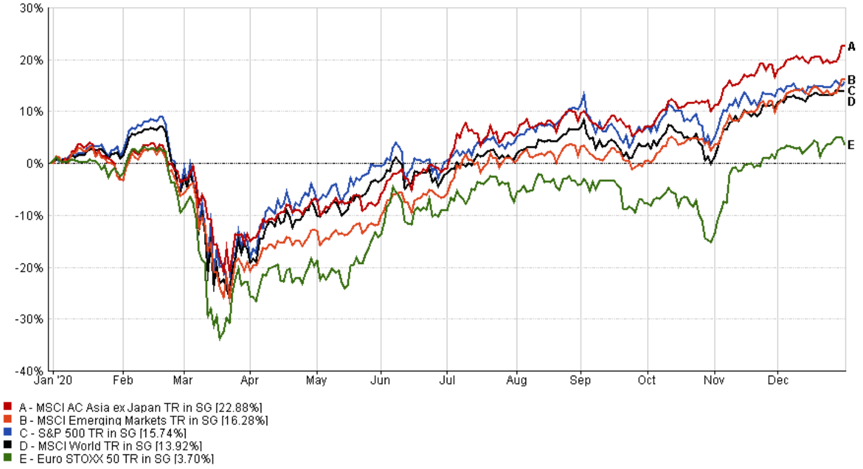|
Investing survival kit 2021: Where to put your money 2 Feb 2021 
Overview 2020 was a year full of surprises. Equity markets treaded higher as 2019 ended on a good note, but the upward trajectory fell to its knees when COVID-19 exploded across the globe. Come March 2020, we were staring at the quickest descent in equity markets in history throwing economies, big and small, into technical recessions that would materialize in the quarters that followed. The recovery that followed in the second half of 2020 was an equally surprising and impressive feat - markets leapfrogged into recovery as central banks and governments bolstered the economy aflush with liquidity and with massive stimulus to pull their economy out of the slump.

Source: FE fundinfo2021, 31/12/2019 – 31/12/2020, in SGD terms. PAST PERFORMANCE IS NOT INDICATIVE OF FUTURE PERFORMANCE.
As 2020 drew to a close, we saw rapid progression on the vaccine front, with countries racing to vaccinate their frontline health workers, priority patients, ministers and citizens. We also saw a Brexit deal come to fruition after years of negotiations, and a US stimulus bill that ended months of back and forth within the US congress parties.
What now, come 2021? Biden has taken US office, that is now a certainty (if we could say it had not been). While we do not have a crystal ball to tell future returns, we can look towards where the professional asset managers think the opportunities lie. 15 fund management firms completed our market outlook survey for 2021. Read on to see where they think we should be putting our money into.
Equities
100% of the managers surveyed are likely to maintain an overweight on global equities throughout 2021. Most managers are optimistic that global vaccine rollouts will enable economies to progress towards normalisation and expects fiscal and monetary policies to remain largely accommodative through the year. Inflation and interest rates are expected to stay subdued, while corporate earnings are expected to rebound, supporting and normalising the extended valuations seen in equities. And with equities offering better risk-adjusted returns than its bond counterparts, the resulting conditions seem to be conducive for risk-taking through 2021.
Most of the managers still believe that equities in the developed economies will have legs in 2021. PIMCO overweight equities, given expectations that corporate earnings will rebound in 2021 and interest rates will remain low, and favours US equity markets given higher profitability and growth characteristics. PineBridge has conviction that European small-caps will shine in 2021, as small-caps are more exposed to domestic drivers which the manager believes will be at the centre of the recovery.
The bet on equities across Emerging Markets (EM) and Asia excluding Japan (Asia ex-Japan) were synchronously bullish.
Invesco thinks that EM and Asia ex-Japan will continue to be favourable - benefiting from cyclical recovery, falling USD and a pick-up in global trade activity. Demand for technology and health care products will continue to fuel Asian exports in the short run and the recovery of Chinese domestic consumption, enabled by successful virus containment, will provide demand for commodity-exporting countries in the APAC region.
Eastspring finds value opportunities across all EM sectors, especially in stocks that has been unloved and out of the limelight. WIthin EM, the manager thinks Emerging Asia is in a stronger position as it boasts healthier balance sheets, and believes strong economic growth and policy support allows Asia to stand out as a compelling investment proposition for ESG (Environmental, Social and Governance).
The heavy-hitting sectors of 2020 did bring some interesting results. Notably, there were no underweights for technology equities, where managers were divided over being neutral or overweight. Invesco expects that tech stocks should still benefit from digitalization trends accelerated by COVID-19. Majority of the managers also believe healthcare and biotech stocks will continue to present good opportunities in 2021.
Fixed Income Turning to fixed income, the views are more divided.
Amundi is underweight on the view that yields are at historical low for both developed market government bonds and US Investment-Grade (IG) credits, and that the default cycle has been delayed by Central Bank liquidity support, but remains overweight on Asian and Emerging Markets USD bonds. Schroders find that spreads have narrowed substantially and credit valuations look broadly expensive, limiting the potential for future returns.
Most managers consider the low yield on US Treasuries unattractive and believe investors will inch towards the riskier fixed income assets. Eastspring remains bearish on a large portion of developed market government bonds which seemingly offer return-free risk, and believes broad USD weakness should lead to opportunities within Asian local currency bonds.
On the riskier end of the spectrum, where high yields and Asian bonds reside, are where the managers’ positive opinions converge. No manager believes they should underweight Asian bonds, while 80% indicated an overweight to the sub-class. PIMCO is constructive on Asia Credit and Asia High yield bonds, as the sectors offer a yield premium over global and US high yield bonds and are on track to recover quicker.
A majority expressed a neutral or underweight stance towards Treasury Inflation Protected Securities/Inflation-linked Bonds, suggesting that managers expect inflation to stay muted through 2021.
Gold & precious metals
As gold loses some of its shine against cryptocurrencies, Fullerton opines that gold is often neglected in risk aversion, reckoning that the asset has its place in a portfolio at any given point in time. Similarly, gold remains a capital conservation asset of choice for PineBridge, as they expect gold to continue to perform well in a sustained low-yielding environment while Central Bank balance sheets continue to expand.
Energy Energy presents a mixed bag, but proponents outweighed dissenters. Invesco believes that in 2021, countries and regions hardest hit by the pandemic, and sectors such as consumer discretionary, energy and commodities, should benefit disproportionately. The manager believes that traditional and alternative energy sources will both be needed to meet growing global demand - especially as the global inoculation campaign gets underway and economies start to normalise.
What does it mean for you? Despite the volatility witnessed in 2020, equities remain the favoured asset class amongst managers with all of them overweighting it in 2021. Fixed income was a mixed bag with divided views, while gold and energy retain their lustre. As vaccination plays out across the globe, a gradual progress towards normalisation and continual stimulus from central bank and government policies seem to favour cyclical assets.
The results offer a quick glimpse of where the surveyed managers believe they will find investment opportunities in 2021. While market consensus appears to lean towards pro-risk assets in 2021, it is important for you to ensure that your portfolio is well diversified and commensurate with your risk appetite and financial situation. Login to your account today and start rebalancing your portfolio with these insights!
Sources: The survey results were derived from submissions by Aberdeen Standard Investments, Amundi, Aviva Investors, Columbia Threadneedle Investments, Eastspring Investments, Fidelity International, Franklin Templeton Investments, Fullerton Fund Management, Invesco, J.P. Morgan Asset Management, Natixis Investment Managers, Nikko Asset Management, PIMCO Investment Management, PineBridge Investments and Schroders.
YOU MAY ALSO LIKE THIS
dollarDEX's Disclaimer
All information here is for GENERAL INFORMATION only and does not take into account the specific investment objectives, financial situation or needs of any specific person or groups of persons. Prospective investors are advised to read a fund prospectus carefully or may wish to seek advice from a financial adviser before applying for any shares/units in unit trusts or making a decision to purchase an investment product. The value of the units and the income from them may fall as well as rise. Unit trusts are subject to investment risks, including the possible loss of the principal amount invested. Investors investing in funds denominated in non-local currencies should be aware of the risk of exchange rate fluctuations that may cause a loss of principal. Past performance is not indicative of future performance. dollarDEX is affiliated with Aviva but dollarDEX does not receive any preferential rates for Aviva products as a result of this relationship. Unit trusts are not bank deposits nor are they guaranteed or insured by dollarDEX. Some unit trusts may not be offered to citizens of certain countries such as United States. Information obtained from third party sources have not been verified and we do not represent or warrant its accuracy, correctness or completeness. Any advice herein is made on a general basis and does not take into account the specific investment objectives of the specific person or group of persons. We bear no responsibility or liability for any error, omission or inaccuracy or for any loss or damage suffered by you or a third party (including indirect, consequential or incidental damages) arising in any way from relying on this information.
All prices and values shown on dollarDEX.com are indicative and is based on prices that is from 2-4 dealing days ago. Fund prices are provided by a third-party and clients should not rely on these prices for decision making. dollarDEX does not guarantee any prices or valuations shown, and accepts no responsibility for their accuracy.
This information does not constitute an offer or solicitation of an offer to buy or sell any shares/units.
This email has not been reviewed by the Monetary Authority of Singapore.
|
To continue to serve you better, our system will be undergoing maintenance between 10 PM to 11:59 PM on 25 Apr 2024. During this period, you will not be able to access your dollarDEX account. We apologise for any inconvenience caused.



